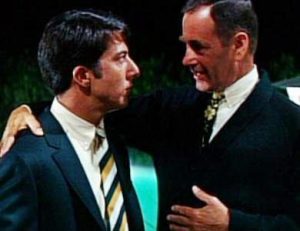All we have to do… is to define ‘consciousness’ explicitly to mean what you call ‘feeling’ (I usually use the word ‘experience’ to avoid ‘conscious’, and define ‘experience’ accordingly). We know what we mean!
A conscious/mental/experiential/phenomenological/subjective state is a state that it feels like something to be in. Hence I prefer to stick to feeling: its much the simplest, most direct and face-valid descriptor.
I think [stones] may be constituted of experientiality.
It feels like something to be a stone? (Or a part of a stone?)
I can even accept ‘decorative’. I understand this to mean that classical zombies are logically possible even though Kirk zombies aren’t.
I think leptons, stones, toasters — and probably also microbes and plants — are zombies. But I can’t explain how and why we (sometimes) aren’t. (It never feels like anything to be them, but it [sometimes] feels like something to be us.) (“Decorative” because we cannot explain feeling’s function.)
Mistake to think [feeling] is a theoretical ‘cost’, for [1] radical emergence is a greater theoretical cost, [2] non-feeling reality is already a cost, because it’s a unwarranted theoretical posit.
I have no problem with molecules and stones and toasters and microbes and plants being zombies. Nothing to explain. Their states are unfelt. I have enormous problems explaining how or why other organisms are not zombies too. But they’re not. Having (genetically coded) traits is surely more costly than not having them.
the biologist doesn’t need an explanation for the very existence of feeling, and has an excellent explanation for the existence of feeling tuned to serve adaptive purposes.
I have yet to hear that adaptive explanation; if (as I believe) feeling is a biological trait, it does need a causal (adaptive) explanation.
One useful terminological option here is to define ‘mind’ in such a way that feeling doesn’t entail mind (see e.g. Russell, perhaps also Damasio) … feeling is v low-level, mind is essentially useful in some way
Hi or lo, I see no causal explanation of this “usefulness.” It’s doings, and the capacity for doing them, that are useful. And if a state is not felt, I have no idea what is meant by calling it mental (and vice versa).
[feeling is physicists’] problem insofar as they propose to offer a general theory of concrete reality
It seems to me feeling’s just biologists’ problem, just as, say, digestion or photosynthesis is. No new physics there.
[functing, ordinary causal explanation, whether in physics or in biology] doesn’t explain the existence of non-feeling matter … to explain that, one would need to answer the question ‘Why is there something rather than nothing’?
Here I show my non-metaphysicians’ pedestrianism: Try as I might, I can’t help but feel that that sort of onticism is otiose.
the view that consciousness is everywhere but isn’t all there is) is [1] independently motivated and [2] explains this for free. Biological evolution sometimes produces an organism O that is not simply made of feeling stuff, in such a way that it (O) isn’t itself a subject of experience, but is also itself a subject of experience, be it is adaptive.
Unfortunately, to my naive realists’ ears this sounds more speculative (and complicated) than explicative. Shouldn’t the explanans be simpler than the explanandum? All I wanted was to know how and why (some) organisms (sometimes) feel rather than just funct!

 Although I don’t think trees feel, I share your feelings about trees,
Although I don’t think trees feel, I share your feelings about trees, 
 They grew for several years, until I realized what I had really been feeling. I became a vegetarian when I turned 17, and told my mother she could empty that drawer now. But it was only in
They grew for several years, until I realized what I had really been feeling. I became a vegetarian when I turned 17, and told my mother she could empty that drawer now. But it was only in 

 One finds oneself almost — but not quite — wishing that Trump’s Korean kaklomacy fizzles. But one must suppose, I suppose, that nuclear war is a greater menace than the metastasis of Trump’s vulgar, ignorant, infantile, egocentric, amoral and anarchic buffoonery.
One finds oneself almost — but not quite — wishing that Trump’s Korean kaklomacy fizzles. But one must suppose, I suppose, that nuclear war is a greater menace than the metastasis of Trump’s vulgar, ignorant, infantile, egocentric, amoral and anarchic buffoonery.